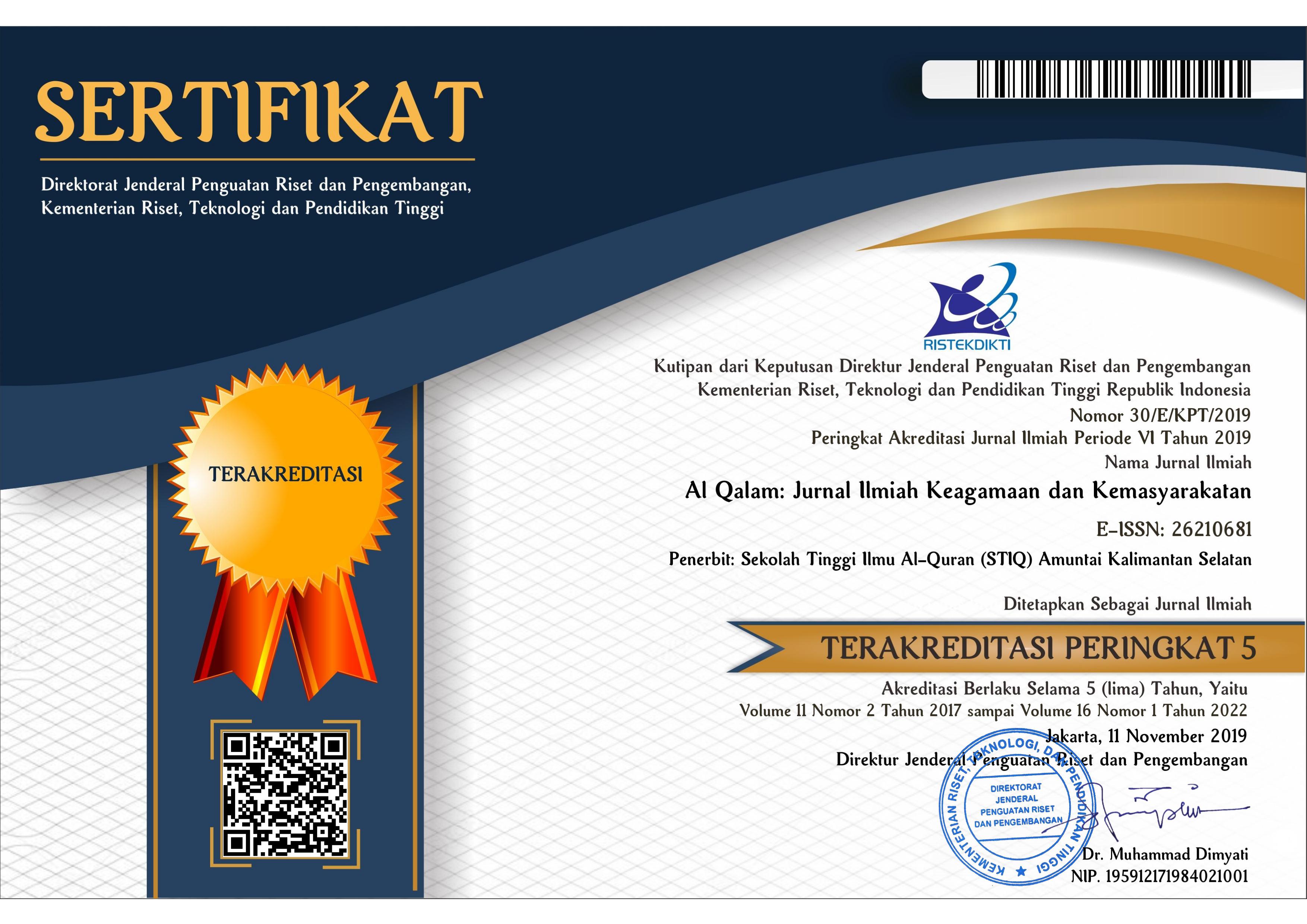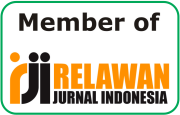Hybrid Learning Innovation: Challenges for Developing Teachers Skills in Indonesia
Abstract
Keywords
Full Text:
PDFReferences
Alsoud, Anas Ratib, and Ahmad Ali Harasis. “The Impact of COVID-19 Pandemic on Student’s e-Learning Experience in Jordan.” Journal of Theoretical and Applied Electronic Commerce Research, vol. 16, no. 5, 2021, pp. 1404–14.
Anggraeni, Desak Made, and Ferdinandus Bele Sole. “E-Learning Moodle, Media Pembelajaran Fisika Abad 21.” Jurnal Penelitian Dan Pengkajian Ilmu Pendidikan: E-Saintika, vol. 1, no. 2, 2018, pp. 57–65.
Caseiro, Nuno, and Arnaldo Coelho. “The Influence of Business Intelligence Capacity, Network Learning and Innovativeness on Startups Performance.” Journal of Innovation & Knowledge, vol. 4, no. 3, 2019, pp. 139–45.
Chai, Siyu, et al. “Analysis of Multiinterface Autonomous Moral Learning Platform Based on Intelligent Computing.” Mobile Information Systems, vol. 2022, 2022.
Chen, Yaru, et al. “Professionals’ Responses to the Introduction of AI Innovations in Radiology and Their Implications for Future Adoption: A Qualitative Study.” BMC Health Services Research, vol. 21, no. 1, 2021, pp. 1–9.
Chirumamilla, Aparna, et al. “Cheating in E-Exams and Paper Exams: The Perceptions of Engineering Students and Teachers in Norway.” Assessment & Evaluation in Higher Education, vol. 45, no. 7, 2020, pp. 940–57.
Dharma, Wahyuni Rizka, et al. “The Utilization of ICT as Pedagogical and Professional Competencies to Support the Professionalism of Chemistry Teachers.” Indonesian Research Journal in Education| IRJE|, 2020, pp. 291–305.
Ellis, Viv, et al. “‘Come to a Screeching Halt’: Can Change in Teacher Education during the COVID-19 Pandemic Be Seen as Innovation?” European Journal of Teacher Education, vol. 43, no. 4, 2020, pp. 559–72.
Ezra, Orit, et al. “Equity Factors during the COVID-19 Pandemic: Difficulties in Emergency Remote Teaching (Ert) through Online Learning.” Education and Information Technologies, vol. 26, no. 6, 2021, pp. 7657–81.
Gelles, Laura A., et al. “Compassionate Flexibility and Self-Discipline: Student Adaptation to Emergency Remote Teaching in an Integrated Engineering Energy Course during COVID-19.” Education Sciences, vol. 10, no. 11, 2020, p. 304.
Gómez-Galán, José, et al. “Social Networks Consumption and Addiction in College Students during the COVID-19 Pandemic: Educational Approach to Responsible Use.” Sustainability, vol. 12, no. 18, 2020, p. 7737.
Gupta, Shaphali, et al. “New-Age Technologies-Driven Social Innovation: What, How, Where, and Why?” Industrial Marketing Management, vol. 89, 2020, pp. 499–516.
Herawati, Andi Febri, et al. “Utilization of E-Learning as Media in Indonesian Language Courses in Higher Education Post COVID-19 Pandemic.” AL-ISHLAH: Jurnal Pendidikan, vol. 13, no. 3, 2021, pp. 2757–66.
Hernández, Ricardo J., et al. “Design, the Language of Innovation: A Review of the Design Studies Literature.” She Ji: The Journal of Design, Economics, and Innovation, vol. 4, no. 3, 2018, pp. 249–74.
Jimenez-Marquez, Jose Luis, et al. “Towards a Big Data Framework for Analyzing Social Media Content.” International Journal of Information Management, vol. 44, 2019, pp. 1–12.
Kelliher, Clare, et al. “All of Work? All of Life? Reconceptualising Work‐life Balance for the 21st Century.” Human Resource Management Journal, vol. 29, no. 2, 2019, pp. 97–112.
Lee, Kyungmee. “Openness and Innovation in Online Higher Education: A Historical Review of the Two Discourses.” Open Learning: The Journal of Open, Distance and e-Learning, vol. 36, no. 2, 2021, pp. 112–32.
Lee, Yi-Ching, et al. “Information and Communications Technology (ICT) Usage during COVID-19: Motivating Factors and Implications.” International Journal of Environmental Research and Public Health, vol. 18, no. 7, 2021, p. 3571.
Leithwood, Kenneth, et al. “How School Leadership Influences Student Learning: A Test of ‘The Four Paths Model.’” Educational Administration Quarterly, vol. 56, no. 4, 2020, pp. 570–99.
Liesa-Orús, Marta, et al. “The Technological Challenge Facing Higher Education Professors: Perceptions of ICT Tools for Developing 21st Century Skills.” Sustainability, vol. 12, no. 13, 2020, p. 5339.
Lüdeke-Freund, Florian, et al. “The Sustainable Business Model Pattern Taxonomy—45 Patterns to Support Sustainability-Oriented Business Model Innovation.” Sustainable Production and Consumption, vol. 15, 2018, pp. 145–62.
Mansur, Maulana, et al. “E-Learning in Physical Education Learning: How Are Students’ Perceptions during the COVID-19 Pandemic?” Journal Sport Area, vol. 7, no. 2, 2022, pp. 171–84.
Ngoepe, Mpho, et al. “Inclusion of Digital Records in the Archives and Records Management Curricula in a Comprehensive Open Distance E-Learning Environment.” Information Development, 2022, p. 02666669221081812.
Powell, Justin J. W. “Comparative Education in an Age of Competition and Collaboration.” Comparative Education, vol. 56, no. 1, 2020, pp. 57–78.
Ramdhan, Muhammad. Metode Penelitian. Cipta Media Nusantara, 2021.
Rodrigues, Helena, et al. “Tracking E-Learning through Published Papers: A Systematic Review.” Computers & Education, vol. 136, 2019, pp. 87–98.
Singh, Madanjit, et al. “Indian Government E-Learning Initiatives in Response to COVID-19 Crisis: A Case Study on Online Learning in Indian Higher Education System.” Education and Information Technologies, vol. 26, no. 6, 2021, pp. 7569–607.
Suryaningsih, Siti, and Riska Nurlita. “Pentingnya Lembar Kerja Peserta Didik Elektronik (E-LKPD) Inovatif Dalam Proses Pembelajaran Abad 21.” Jurnal Pendidikan Indonesia, vol. 2, no. 07, 2021, pp. 1256–68.
DOI: http://dx.doi.org/10.35931/aq.v17i2.1959
Refbacks
- There are currently no refbacks.
Copyright (c) 2023 Al Qalam: Jurnal Ilmiah Keagamaan dan Kemasyarakatan
Al Qalam: Jurnal Ilmiah Keagamaan dan Kemasyarakatan
index by:
Publish by:
Sekolah Tinggi Ilmu Al-Qur'an Amuntai
Contact us:
Address: Jl. Rakha Pakapuran, Amuntai Utara
Kabupaten : Hulu Sungai Utara
Kode Pos : 71471
Provinsi : Kalimantan Selatan
Telephone : 085251613000
Email: hafizhihusinsungkar@gmail.com

This work is licensed under a Creative Commons Attribution 4.0 International License


